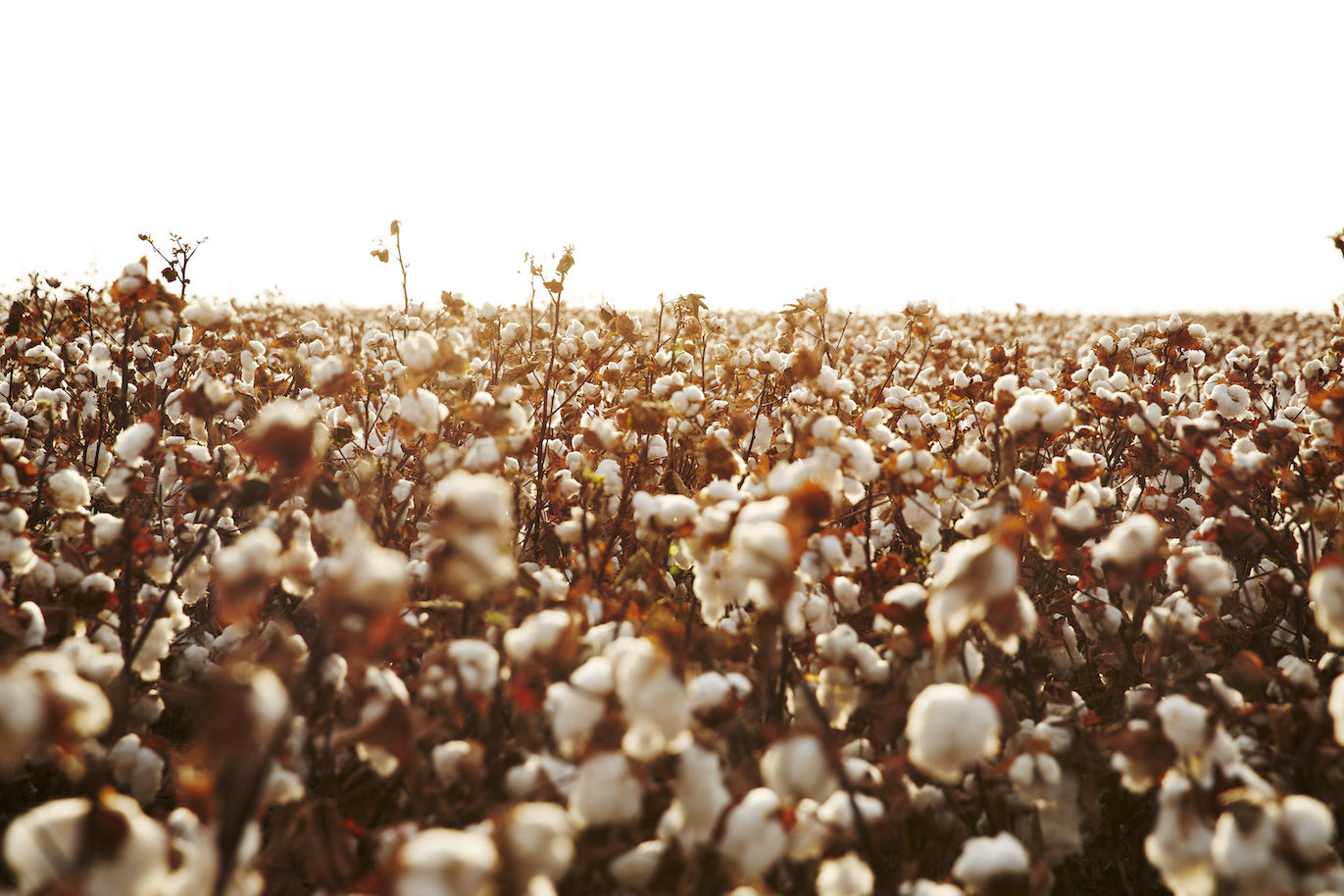We know the big brands want in on the sustainability conversation, whilst still producing tens of hundreds of thousands of units per product. They love a good Organic Cotton t-shirt - not enough to make their whole range in it mind you - but enough to pretend to be ‘conscious’. (Oof, did I say ‘pretend’?!)
Organic Cotton is certainly a great way forward for cleaning up the supply chain, but it is not the only way forward. And this is a good thing! Currently only 1% of the World's cotton is organic. We need other solutions, and there are even better alternatives, such as regenerative farming.
The Japanese denim of the Zadie Boyfriend Shirt is from Canclini, the Italian fabric mill using only Supima cotton
Regenerative farming is effectively a loop system - we keep our soils healthy, the soil retains water and carbon, plants grow and propagate. Other plants are allowed to grow around these plants, adding other nutrients to the soil, naturally fertilising the crop. More plants grow, the cycle continues.
The healthier the soil, the less water is actually required. Soil is kept moist by nature itself, and whilst water is retained in the soil, it can also evaporate into the sky, collecting as clouds, aka water vapour, and then falling again as rain. The constant loop.
A small note to state here that this is why climate change is such a problem. If we get hotter, drier, longer seasons, but then a sharp, short downpour of rain, we end up with dry soil (effectively dust and dirt, and lacking in nutrients), which then gets flooded in the downpour. The soil does not retain water at this stage, because it is too dry and degraded; it simply becomes mud. The ground is no longer healthy. A more consistent cycle of lighter levels of watering is required to maintain healthy soil. Once the nutrients have gone, it is a long process to replenish health to the soil.
So now you have the short background on healthy soil, here’s why this is important at Saywood.
We work with just a handful of fabric mills at Saywood, and one of these is Canclini, a mill based in Como, Italy. They specialise in cotton shirting fabrics, and all of their cotton is sourced from the US; they use only Supima cotton.

The cotton boll; the fibre giving part of the plant
What is Supima Cotton?
Supima is a branded cotton; it is a long staple fibre known as pima cotton, but being branded as Supima, it goes beyond this long staple fibre.
Supima cotton is only cultivated and grown only in the US, by a small collective of 500 small family run farms, with 93% being local to the California state area. They use eco-friendly methods to grow and harvest the cotton, as well as ensuring a high level of social responsibility and good working practises for everyone in the Supima supply chain. The Supima farmers are ensuring as little environmental impact as possible, through preservation of soil health and conservation of the water that nourishes the soil. Less than 1% of the cotton grown in the world today is Supima.
Firstly, these pima cotton fibres, produced by Supima farmers, are extra-long staple fibres. Not only do these super fine fibres make super soft cotton, but they are also very strong, and can retain a rich level of colour due to being able to be fully absorbed into the thin fibres, even over time after many washes. The fibres can be pulled without stretching, meaning the garment will keep its shape over time. This makes the fabric highly durable and long lasting; perfect to be loved always.
Traceability
Supima uses forensics to create a fully traceable product, so a garment can be traced right back to the field it came from. Partnered with forensic scientists, Oritain, samples have been collected from each field the cotton is grown in and fully analyzed. On the farms, cotton naturally absorbs different levels of chemical elements and isotopes, so with the Oritain database, each garment can be traced and matched back to those of the individual fields.
Minimal Inputs, Maximum Yields
Supima farmers use technology to ensure the crop is managed efficiently, to maintain healthy soil and reduce water consumption. Farmers monitor the health and moisture of the soil, and understand the make-up of the soil, to determine whether to use either drip irrigation to directly feed the plants only, or flood irrigation to restore moisture to the soil, which also helps to foster wildlife.
Satellite technology is used to monitor the fields and soil health, so that the farmers can assess the exact needs and current state of the fields. If they see a field not looking at full health, they know where to take samples to assess the health of the soil and monitor any potential pest issues. Crops are rotated through the fields to aid nutrient levels in the soil; different plants provide soil with different nutrients, which is why it is really important to avoid mono-farming. This also helps to keep soil health in balance. And just to make sure damage isn’t caused by tractors, GPS guided tractors are used to keep the wheels on the same path as previously used.
Supima farmers use GPS guided trackers to follow the same paths so as to avoid any damage to the plants
Beyond the Fibre
Supima ensures that all parts of the plant are used, so that it is zero waste. Of course, the cotton fibre is used to make cloth, but all the rest is important too. The stalks, stems and leaves are all used for bedding for local livestock. It is so important to consider waste in all processes, because often, one person’s waste is another’s treasure.
The seeds from the plant are also a key product of the crop. Not only can you grow new plant from seed, but the seed also contains cottonseed oil, which is very valuable as a premium oil due to the flavourless, odourless nature and it’s high flash point, meaning it is less flammable and less hazardous. The shell of the seed, once the oil is extracted, can then also be added into livestock feed as it has a high source of protein.
The Ethics
As small family run farms, it is in the farmers interest to maintain the health of the fields, soil and wildlife, because wildlife is all part of maintaining healthy soil. These farms are passed through generations, and it is a Supima policy that everyone is paid a fair living wage on the farms and in their processing mills.
Whilst Supima cotton still only makes up less than 1% of the world's cotton, Organic Cotton equates to only 1% too. Cotton can be grown in a more planet friendly and ethical way, but we need to slow down the process. Grow and harvest cotton more mindfully, taking care of the fields and environment it is grown in, and by extension supporting soil health and wildlife. The only way we can do this across the board, is to stop producing at such high rates, and this refers to high speed. It is too much for the farms to take, and this is what causes the damage to the Earth; by using too much water, too much intensive fertilisers, and too much pest control, just to get speed to market.
The Edi Volume Sleeve Shirt in white. This soft as butter cloth comes from Canclini, who use only Supima cotton.
We have the ability to produce sustainably. We need to do this now. At Saywood, choosing to work with the people and businesses that are working towards the same goals, that uphold the same values, is so important. It is these decisions that go into every aspect of our brand. Beautiful pieces for you, beautiful pieces for the planet.






